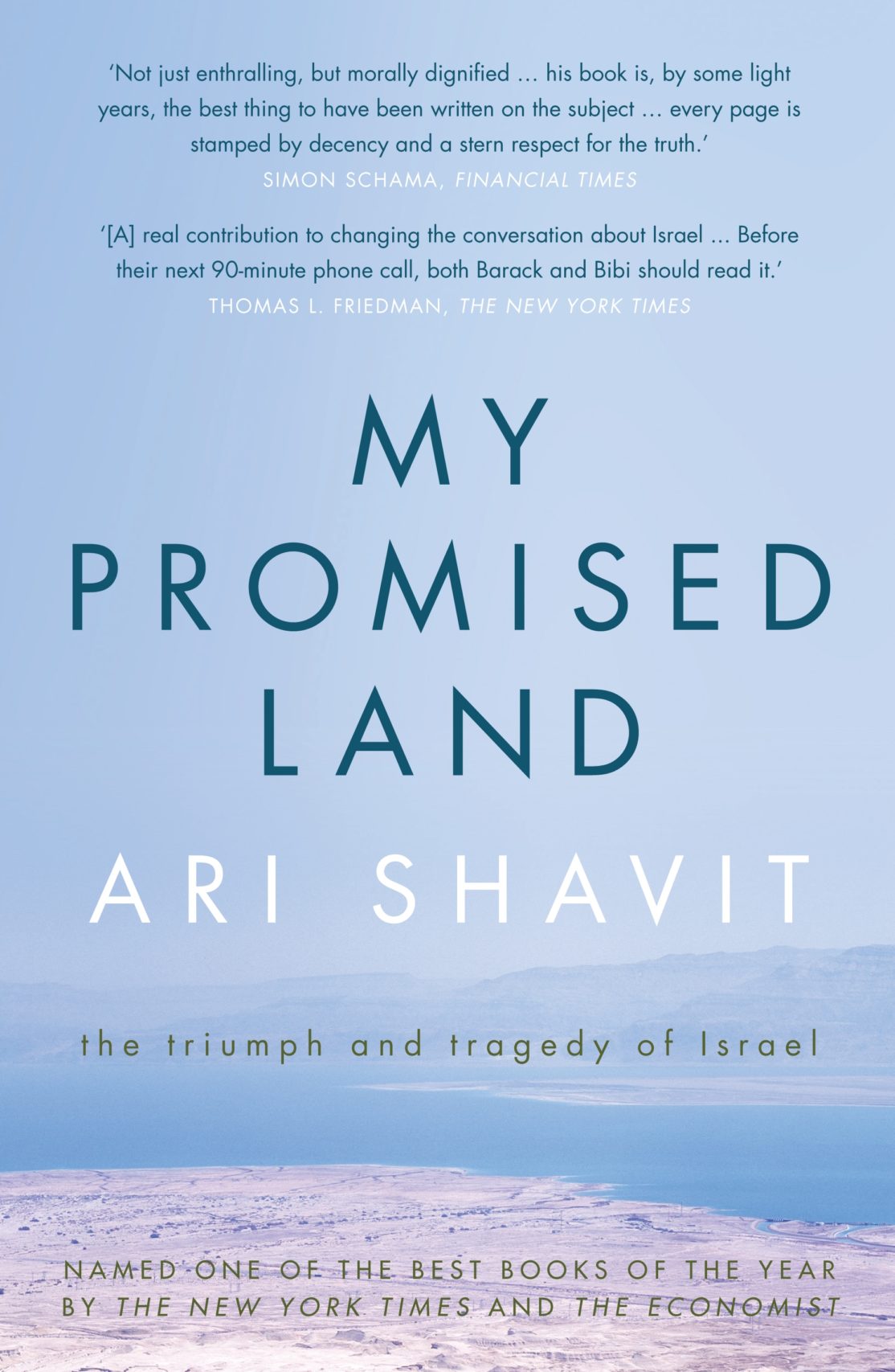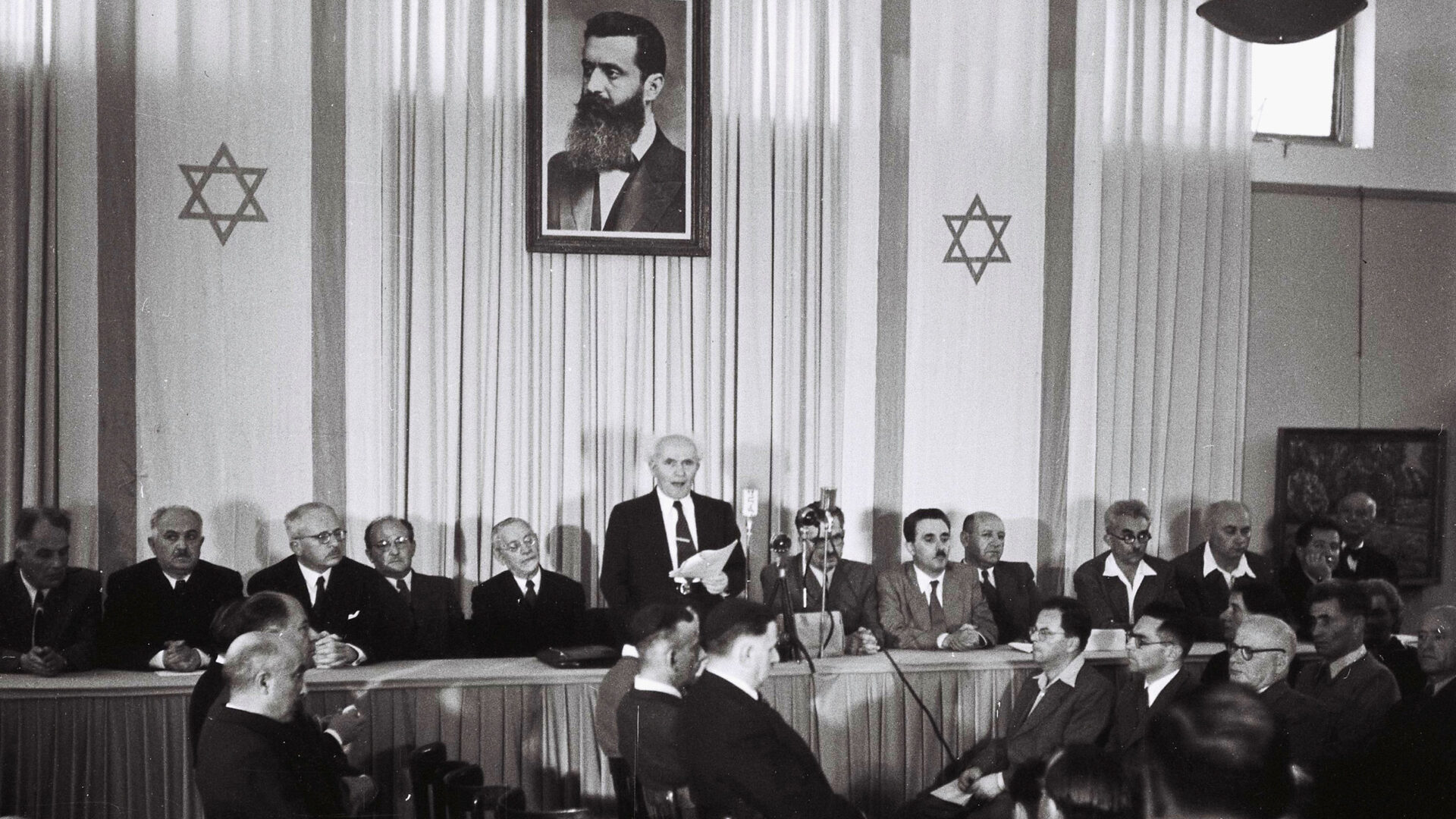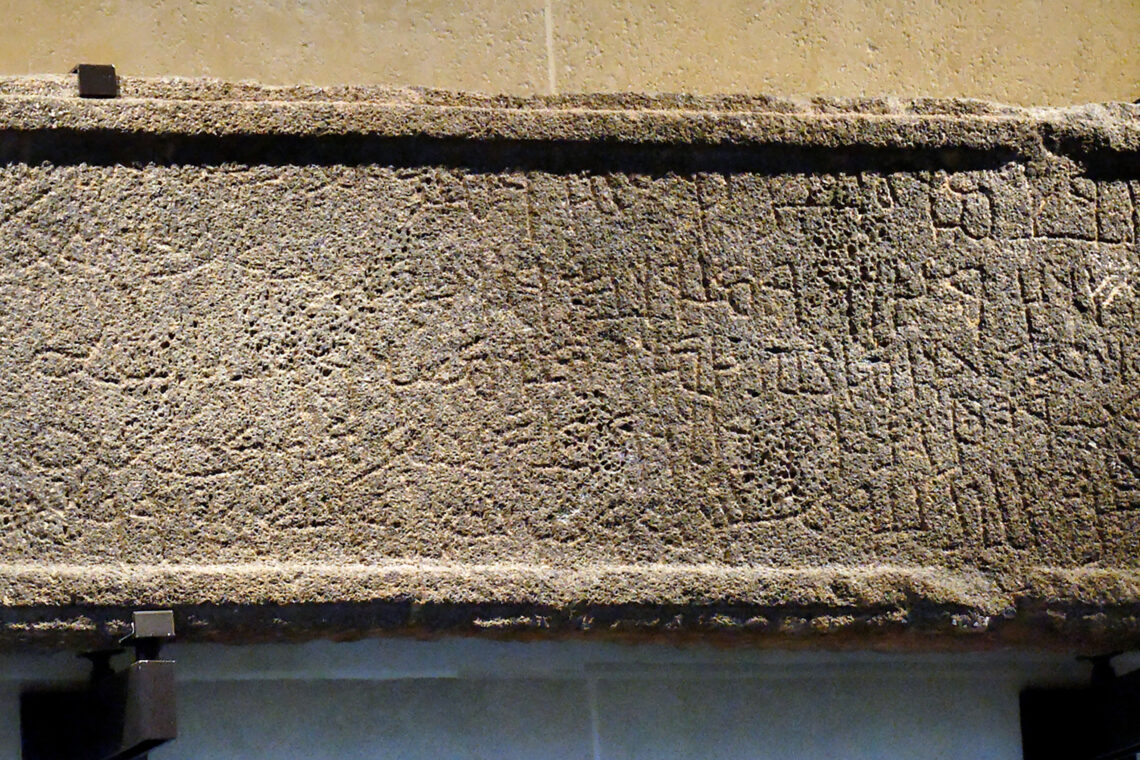The moment I heard about Ari Shavit’s book, My Promised Land: The Triumph and Tragedy of Israel, I hastened to get a copy, then another one when I joyfully shared my first one with a prominent Moroccan Jew before I could delve into it. All I needed was a brief Christmas break in Maine and a few moments of tranquility to follow in the footsteps of the renowned Israeli journalist, as he travels across decades and landscapes, valiantly trying to stitch together a narrative about the birth and progress of his beloved state of Israel. The impressionistic narrative does add up to an arresting drama, an epic tale of practical dreamers intent on redeeming God’s scriptural promise, a major revolutionary event that quite possibly eclipses most of the great events of the last century.

For the story of Shavit’s native land is worth telling because the future of Israel and of Judaism should be of concern to anyone who has been shaped by Christianity and Islam, since these two religions, whatever their adherents may say in sincere protest, have spent centuries and millennia harassing, persecuting, annihilating, and, not infrequently, hypocritically benefiting from the contributions of their victims. Today, the Jews count less than 20 million in a planet teeming with billions. That a few members of an ancient religious civilization have survived untold horrors and managed to create a state for themselves in a land that escaped their control for almost 2000 years is a miracle indeed. The whole world should sit down and listen to Shavit.
First, we need to remember how religious nostalgia and persecution, combined with the ascendancy of European power in the 19th century, encouraged the immigration of highly industrious and talented European Jews to Palestine. In an irrepressible fit of enthusiasm, they drained malaria-infested swamps, turned local oranges into a globally coveted fruit, built major universities and research institutes before the horrors of fascism and Nazism were visited on their brethren in Europe. Unbeknownst to them, pioneer Zionists in Palestine were laying the foundation for a refugee camp for Jews, one that could grow into a sovereign state. It mattered less for these Zionists if they landed in a country long described by travelers as dusty and desolate; if this place is what had been promised to them, then they would turn it, come what may, into the biblical land of milk and honey. That’s why I started by saying that secular Zionists redeemed their own biblical God by making good on a promise that had remained unsubstantiated since ancient times.
It was this godly secularism (unlike those of the Protestant and Puritan pilgrims, to whom Israelis are often compared) that blinded them to the natives and, in time, to the limits of their own power. And who could blame them? Their talent was not unleashed to build edifices for their tormentors back in Europe, but to erect their own nation on ground their ancestors had always considered to be holy.
Arabs, however, would not let that happen without a fight. Religious fundamentalists such as Al-Kassam mobilized to fight the Jewish scourge in their land. Violence ensued. By 1942, the 350,000 Jews in Palestine turned into “community of combat,” says Shavit. The following year, the British Peel Commission recommended partition and a reciprocal transfer of populations into their respective communities. Some Zionists saw this scheme as unworkable and unflinchingly argued that the land could only support one nation. Even Israel Zangwill, the progressive author of the much-acclaimed play The Melting Pot, shared such views at one time.
As the Arab revolt grew in intensity, the Jews started arming themselves and organizing into militias and armies. The Haganah was born and, in 1942, the Masada episode of 73 AD, long read as an act of “suicidal extremism,” turned into the symbol of this nascent nationalism. That same year, Jews were deported to extermination camps in Europe and “2.7 million Jews were murdered by the Nazis.” As would occur often in this tale, one couldn’t find a more powerful justification for Theodor Herzl’s vision of a separate homeland. The Jews had no place in history; their only option was to defy it. Nuance was not a luxury they could afford.
Therefore, no sooner was Israel established than an ugly war was waged on the Arabs of Lydda, who were massacred and expelled from their houses under the threat of annihilation, marching out in columns reminiscent of the expulsion of Jews from Granada in 1492. And this was happening in the aftermath of the Holocaust. That’s why Lydda is, to Shavit, the “black box” that hides “the dark secret of Zionism.” But, then again, what is the proud Israeli Shavit to do? Renounce Zionism and uphold an abstract morality of right and wrong? He can’t because there are simply no easy answers.
And so Shavit probes and wrestles with the dilemma of Israel, a nation that had to come into existence but that is nevertheless haunted by grave moral complications. By 1957, on the eve of the 10th anniversary of the founding of Israel, when Shavit was born in Rehovot, Israel was already a modern economic powerhouse with an egalitarian social structure. It was “the most stable and most advanced nation in the Middle East” and the “most remarkable melting pot of the twentieth century.” But this miracle was erected on a deliberate act of national amnesia. The traumas of the past (including even the Holocaust) and the traumas of the Palestinians were either downplayed or denied, removing any subtleties from the national project, and focusing only on regeneration, building, and even more building. Yearning for the bourgeois lifestyles left behind in Europe, mourning dead parents in concentration camps, feeling for the local Arabs who were violently displaced were handicaps to progress.
With unlimited will, abundant energy, and limitless drive, the Israelis didn’t waste any time borrowing nuclear know-how from the French to build a facility in the Negev desert—Dimona. To this day, the whole project is shrouded in mystery. Israel is most certainly a nuclear power, but the state has been disciplined about never flaunting its might; it is what Golda Meir called varenye—jar of fruit preserves East European Jews kept to survive the hardships and famine during pogroms. It was Dimona that allowed Israel to relax and develop the arts and sciences, to become a modern nation, with individuals pursuing their passions, and even ensuring a degree of peace in the region. Yet, as with Zionism, Shavit can’t help but wonder whether the “colossal deed of Dimona” is a “blessing for generations to come or a malignant curse.”
Every episode of triumph—every act of glory—eventually crashes on this nagging question, this dreadful doubt.
The attacks on Israel in 1967 and 1973 only emboldened Zionist expansionism, leading to the construction of settlements, such as Ofra in the West Bank, that have now become nearly impossible to dismantle. Defenders of Ofra believe that without such a strategic presence–on historic biblical lands, no less–Israel, with its tired Labor Zionism, has no future. To them, handing over the Sinai back to Egypt is a catastrophe that spells doom. The West cannot be trusted to defend the beleaguered state indefinitely. Further, some settler activists, like Yehuda Etzion, believe that only Second Temple Judaism, the kind that rejected Hellenism in the first century AD, is the answer to the softening of Israel’s mores. Israel needs to bring God back into history and revive its lost kingdom, complete with its Sanhedrin. The Torah is what’s needed, not the concepts of the Enlightenment. The mosques on the Temple Mount need to be blown away.
Needless to say that such fundamentalist views are profoundly upsetting to liberal Jews; but, once again, Shavit reminds us that as distasteful as they may be, such views are not out of sync with historic Zionism. “Ofra is Ein Harod’s grandchild,” he reminds us. Like a bad virus, it is a dangerous mutation on Zionism, since, by being so blatantly colonialists and operating outside of international legality, settlers undermine support for their state. One might add that it may be helpful to recall that it was such messianic zeal that ultimately led to the destruction of the Second Temple.
In 1991, the dovish Shavit ended up being a guard in a detention center in Gaza, coming face to face with the damning reality of occupation. The facility, with towers and barbed wire, where young men resisting colonialism were confined and tortured, easily evoked the Nazi camps where Jews perished. Many Israeli soldiers shared his anguish, but they adapted in no time to the regime, their doubts giving way “to the banality of a soldier’s life. When is the next furlough? When can we call home? When will the new uniforms arrive?” It is at moments like these that Shavit knows that giving up the occupation is not really about swapping land for peace, but the only way for Israel to salvage its decency, humanity, and soul.
The peace efforts of the last two decades have been repeatedly undermined by mistrust, bad faith, lack of vision, and mounting zealotry. Following his historic handshake with PLO chairman Yasser Arafat on the lawn of the White House in 1993, Prime Minister Yitzhak Rabin was assassinated. Oriental Jews, who could have been deployed to build bridges with Arabs, emerged as religious fundamentalists intent on undercutting Ashkenazi supremacist attitudes. Educated and successful Israeli Arabs, growing in numbers, and comforted by hundreds of millions of Arabs and Muslims beyond their immediate borders, remind Shavit that time is incontrovertibly on their side and that the two-state solution is, in fact, no solution at all.
Shavit is aware of the dangers. By 2006, he was warning his fellow citizens about the corrosive political correctness of the elites who insist of treating Israel as a normal country, those who forget that Israel “is a Jewish state in an Arab world, and a Western state in an Islamic world, and a democracy in a region of tyranny.” Israel doesn’t have the luxury to be a pure Athens; it must be Sparta, too, he argued. The dove and the hawk must fly together over his promising but troubled land.
The author still hopes for the rebirth of national purpose in an increasingly class-divided society and promptly cheers for Itzik Shmuli who, in 2011, managed to turn the occupation of Rothschild Boulevard in Tel Aviv into a national protest attracting some six percent of Israel’s population. “In many respects,” writes Shavit, “the 2011 revolt is the most impressive of all Israeli revolts. Neither the settlement nor the peace nor the Oriental Shas movements was ever able to gather so many Israelis with such enthusiasm and broad-based support.”
Two years later—in 2013–the existential threat to Israel was distant Iran, a threat that Shavit has been announcing before most people even noticed. Iran was on the verge of breaking Israel’s Dimona shield because the Israelis, distracted by selfish individual pursuits, no longer had the courage to implement the preemptive action known as the Begin Doctrine. Such despair was justified since the author finished writing before President Obama managed to convince Iran to open its facilities to stringent inspections that would ensure compliance and, at least, delay the process of enriching uranium to make a nuclear weapon.
Confronted by a number of seemingly insoluble existential challenges, Shavit ends his frustrating journey with a defiant note, excusing the very traits that he had criticized for undermining the ethos and cohesiveness of classical progressive Zionism. If Israelis are “so neurotic and loud and unbearable” it’s because they “dwell under the looming shadow of a smoking volcano.” Despite being encircled by enemies—Islamic extremism, failed Arab nationalism, Palestinian resistance, in addition to other social failings of the Israelis’ own making—the Jews of Israel have flourished and built a state-of-the-art nation. One might be gloomy about future prospects but, in the end, life goes on, as it does in the Tel Aviv and Jerusalem nightclubs, where abundant drugs and instant emotionless sex provide quick, uncomplicated relief. Israel offers “the intensity of life on the edge,” concludes Shavit, “the adrenaline rush of living dangerously, living lustfully, living to the extreme.” This apocalyptic hedonism may differ drastically from the levelheaded approach of pioneer Zionists, but it is equally daring, even if somewhat foolhardy. To the extent Israel gave life and freedom to the Jews, dancing the night and day away is a sure sign of success.
Shavit does justice to his topic and has managed to pull us along on the exhilarating and frightening roller coaster of Israel’s history and its future. His well-calibrated interviews and tone, mixed with autobiographical elements, shield his perspective from narrow ideological stances. This is, in fact, one of his major accomplishments. The book is a reliable roadmap for those seeking to appreciate the complex situation in Israel today.
Another unintended strength of Shavit’s story is that it works as an intriguing puzzle, one that the author somehow never seems to consider, even though it permeates every page of his book. How come, one wonders, such brilliant, innovative and entrepreneurial Israelis, swamp drainers and masters of the start-up tech culture, accomplished scientists and inveterate problem solvers fail so miserably to banish the threats that are haunting their nation and devise an enduring peace that relieves them from their never-ending anguish and fear? If peace is the most coveted prize of all, why not invent groundbreaking approaches and new solutions to reach that goal? Relying on power and force to buy time and weaken resistance strike me as too unimaginative and palliative for such a creative people. It just doesn’t make sense.
I think the problem may have to do with an unexamined notion of secularism, one that Shavit shares with his clearheaded and progressive Zionist pioneers, but which is somewhat at odds with Theodor Herzl’s vision. Let me explain. When Shavit laments the rise of the political party Shas with its Orthodox agenda, the hazy liberalism of elites, the hedonism of the youth, or the economic domination of the few, he is making a case for the late-19th and early 20th-century secular Zionism that built Israel. But that Zionism itself was based on the idea of saving, protecting, and renewing the life of Judaism, even if the political agenda itself was articulated in a secular and nationalist language. At its inception, Zionism appears as a modern secular, even communistic, political movement designed to protect members of an ancient Middle Eastern monotheistic religion.
This is the overlooked contradiction in the whole affair. The incongruity of motives is rather striking. It’s as if we have Silicon Valley geniuses intent on preserving the Puritans’ religion and identity. It is this declared or undeclared attachment to Judaism that may be hindering Israel’s progress. One can understand why a long-suffering and persecuted people accustomed to perseverance would insist on identity in the face of all odds—that is exactly the survival strategy that allowed Judaism to remain a living faith. But unexamined habits can also be liabilities. We live in a different age and our knowledge of the world is radically different. Worshipping the past, as the American Transcendentalists Emerson and Thoreau told us, is not necessarily the best way to honor our heroes. If Judaism was invented to meet the needs of a people at a certain time in history, Israelis must think of new ways to meet their own needs in the 21st century. Ancient Jews invented the kind of religious monotheism that has dominated much of the world in the last few thousand years, giving rise to an intolerance that came back to haunt them. Monotheism and orthodoxy, in the long run, worked against the Jews. For Jews to insist on their religious and cultural purity in a world where their numbers are negligible is, at least to me, strategically short-sighted.
Shavit loves England but fears its deadly effects on his Jewish identity. The question now is why insist on a pure Jewish identity? Why hang on so desperately, even destructively, to an ancient idea when we can devise new identity structures to contain our own contemporary realities? Where are the visionaries and innovators to help us think differently about ourselves? Millennia ago, a Middle Eastern people elaborated a monotheistic worldview and handed it down to the generations that followed. Such view spawned Christianity and Islam and doomed Jews to centuries of suffering. Why can’t we let this worldview go? Why isn’t being human enough?
This, I suggest, is our challenge today—to let go of unproductive ancient systems of identity construction. As someone who grew up a Muslim in Morocco, I know all too well what it takes to have people sidestep their convictions and read their faith through historical lenses. We need to believe that we can live without ancient gods. And if we believed that, then the issue of the “promised land” would turn into a mere issue of land, one that can be negotiated politically. Readers would be right to say that Muslims and even Arabs are nowhere near this state of mind, that Israel, as Shavit notes, has no reliable partners, and I would agree. But let Israelis say that everyone is equal in their nation, that Jew and Arab have the same rights and opportunities in their state, even if politicians like Prime Minister Benjamin Netanyahu manage to get it recognized as a Jewish state as a condition for peace with the Palestinians. This is what needs to be heard loud and clear. This will give Israelis the higher moral ground from which to extend a genuine hand of peace and put the entire Arab and Muslims worlds on the defensive.
Theodor Herzl, we need to recall, imagined a Jewish state as a human rights project, for the Jews were united, first and foremost, by their persecution. “We are what the Ghetto made us,” he wrote in The Jewish State. His state would, therefore, benefit all oppressed minorities. It would be a nation where freethinkers and non-Jews benefit from equal rights. If we are not quite there yet, it’s partly because the excess of religion is hampering the search for a workable solution. I said as much in my latest book, Islam and America: Building a Future Without Prejudice (pp. 129-36), even though, as I showed in my chapter “Muslim Jews” in We Are All Moors: Ending Centuries of Crusades Against Muslims and Other Minorities (2009), Jews and Muslims were ironically united by their difference in the eyes of their Christian persecutors. For almost a thousand years, the destinies of Jewish and Muslim minorities were intertwined since, among other things, Jews developed a significant corpus of their religious and cultural legacy in Muslim lands.
Shavit is right to note that Israel was designed for European Jews, not for the Oriental ones who continue to suffer discrimination, but one should also remember that a few prominent European Jews, including Britain’s prime minister Benjamin Disraeli, saw themselves as displaced Orientals in Europe. (This feeling doesn’t come through in the persona of Shavit’s great grandfather, the Anglo-Jewish Victorian Herbert Bentwish, who first visited the Holy Land in 1897.) Disraeli, a descendant of Sephardi Jews on his father’s side, called Jews “the Arabian tribe” and Arabs “Jews upon horseback.” In some of his fiction, he regarded Jews as “Mosaic Arabs” who were the cousins of “Mohammedan Arabs.” He would not have Jerusalem fall into the hands of upstart Europeans and preferred a secular Jewish state with equal rights for Jews and Arabs. Similarly, when 19th-century European Jews looked for architectural models for their synagogues, they chose the Moorish style, believing it was the closest to the original Temple of Solomon. Even Zionism itself was, in some instances, an attempt to reconnect with the Arabs of the East. The association of Jew and Muslim in the Christian European imagination lasted until the dark days of the Holocaust, when the most helpless Jews were codenamed Muslims by their Nazi captors. We have a history of common suffering—as well as a glorious one of creativity—on which to build the foundations of peace and understanding. This important, perhaps even vital, project has yet to be undertaken with the seriousness that it deserves.
There is much work to be done if our ultimate goal is peaceful coexistence in the Middle East. The vast Arab and Muslim worlds are still governed by an implacable form of late antique monotheism that leaves no room for serious differences, dissent, choice, or freethinking. Unlike Israelis, Arabs and Muslims find contentment in purchasing Western goods and other people’s know-how, not in the joys of research and production. Oil money may be flooding global markets and buying the best of everything, but such conspicuous consumption only distances Arabs and Muslims from the dynamic Israelis. One could only imagine what the Arab world might be if its oil ever became irrelevant to the global economy.
The question, in the end, is not about whether Israel can survive indefinitely in its hostile environment (even though that is a huge part of the problem), but whether Israelis and Jews could find the courage to think about how best to define Jewishness and Zionism for themselves and the world. To assume that revolutionary thinking about identity is no longer possible today is to succumb to an unproductive form of intellectual fundamentalism. If Judaism showed Muslims the way to monotheism, then a renewed form of Jewishness can show us the way to diversity and openness. If British Pilgrims and colonists brought their prejudices with them to the New World, their descendants eventually were forced to overcome their biases and make it possible for people like Obama to become president. Only such flexibility allows systems to endure; closed, rigid ones may survive for a while through sheer fundamentalism, but they run out of steam and creativity before they are swept aside by the tides of history.
We don’t want this to happen to Israel. We all need to fight for that nation’s survival, for it is home to about half of the world’s Jews, heirs to an ancient religion that influenced the birth of Christianity and Islam, and gave much to our global heritage. Measured by their own numbers, Jews are an endangered cultural species; to see them vanish out of history would be an incalculable tragedy since they have already come so far and have fought so hard to survive. What I personally would like them to do is to find new ways to lead us into an exciting, progressive future, not dissimilar from what Herzl imagined in his not-so-utopian novel, Old New Land, even though, as Shavit notes repeatedly about Zionism in Israel, the Arabs remain insufficiently developed in that book.
In Herzl’s imagiantion, Israel would be a humanist utopia developed by Jews for the benefit of the whole of humanity. In his 20th-century Jerusalem, the city grows into a metropolis, holy sites remain undisturbed, and a new Peace palace—whose motto “Nil humani a me alienum puto” or “Let nothing human be alien to me”—has been added.
As I sit in a hotel in Rabat, Morocco, wrapping up this review essay, I wonder whether the motto Herzl devised for his Peace palace would ever be given a chance. Who knows? It might help guide Israel into a more secure future and save the world’s Jewish heritage for generations to come.





Comments are moderated by the editor and may not appear on this discussion until they have been reviewed and deemed appropriate for posting. All information collected is handled in a manner consistent with our privacy policy.